If you’ve been in the content marketing game for long enough, you might have already come across the term SEO (Search Engine Optimization).
In fact, it’s getting thrown around more lately, and it’s easy to see why.
In layman’s terms, SEO is anything done to improve SERPs’ ranking on SERPs (search engine results page). It’s the simple science of developing, fine-tuning, and adjusting the code and content in your site to boost your chances of ranking high on search engines like Google, Bing, DuckDuckGo, etc.
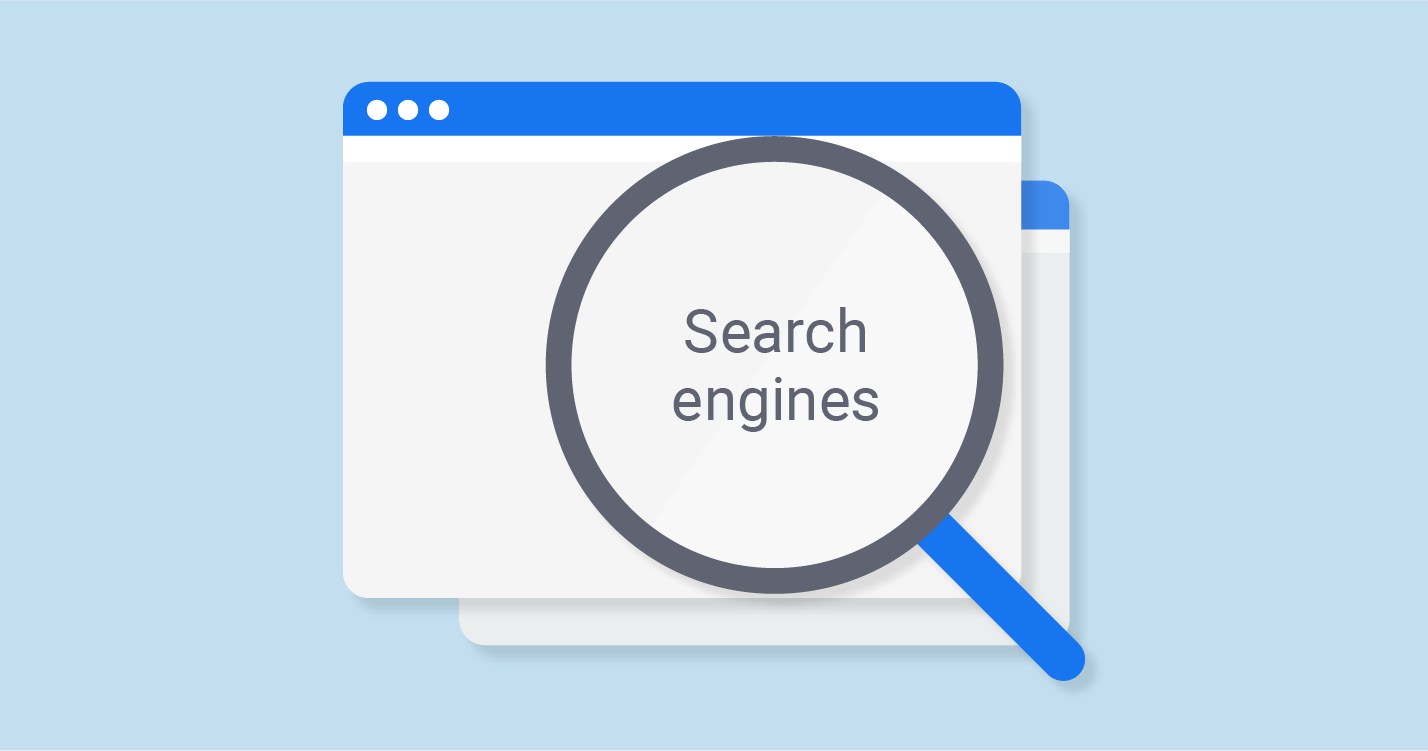
So if your brand lacks a solid online presence, you’re missing out on a lot of perks (think: more site visitors, more conversions, and inevitably, more sales!).
Now that we’ve defined SEO, you might be wondering if there are any tools out there that are worth their salt, tools that can elevate your SEO game.
Thankfully, there is.
Here, you’ll learn everything you need to know about paid and free SEO tools. Let’s dive right in!
What Are SEO Tools?
Like the name suggests, SEO tools assist website owners to rank high higher in SERPs.
They help optimize web content by analyzing the content for target keywords, ranking, traffic, and other SEO considerations.
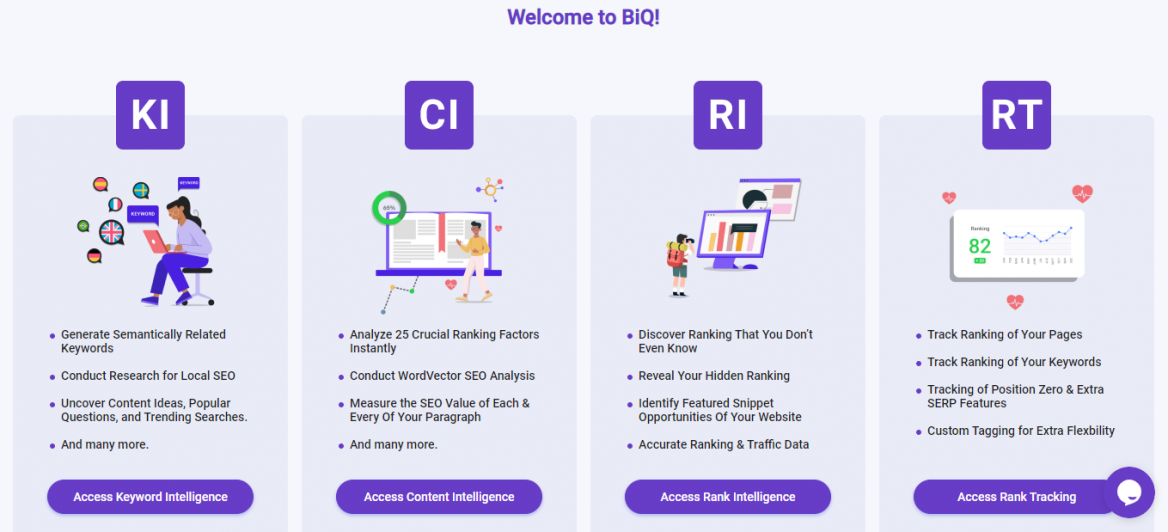
SEO tools save you from the taxing work of data analysis and keyword research. With these tools, you’re able to see what part of your content marketing strategy is working and which parts could benefit from a bit of tweaking.
Many marketers with multiple websites to manage often end up putting a lot of data in Excel spreadsheets and gleaning insights manually. But that becomes challenging and increases the chances of SEO reports being compromised, inaccurate, or inconsistent.
The good news is, you can use SEO tools to save hours of manual effort and generate insightful data on the fly.
It gets better.
Some paid and free SEO tools can help you size up your competition and see where the greatest opportunities lie.
Think of it as some cheat code to help you thrive in the competitive digital marketing space.
Wondering what else to analyze with SEO tools? There is an array of items to consider, including:
- Keyword
Businesses with strong targeted keywords in their company name rank 1.5 times higher than the rest, says the Local SEO Guide.
But how on earth were you supposed to know that! Right?
Keywords are the glue that holds together your digital marketing strategy. Ignore them, and your website will never truly take off.
SEO tools help you identify such keyword issues. They help you pinpoint and analyze the most common search terms related to your website and the competitors using the same keywords.
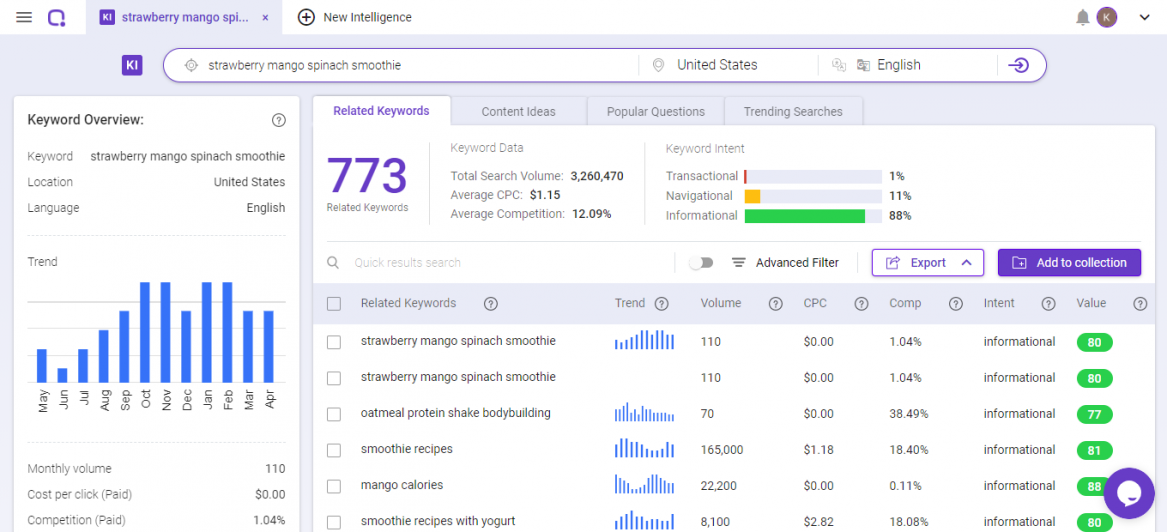
BiQ’s Keyword Intelligence is one such tool. Not only does it help you choose keywords that genuinely pack a punch, but it also opens the door to more content ideas that will keep your readers yearning for more.
- Content
Your content is as good as dead if it’s not SEO-friendly.
Not only should web content contain keywords, but it must also be relevant, unique, and interesting to rank high in SERPs.
Most free and paid SEO tools to help make sure that your content checks all the right boxes. Some go as far as identifying gaps in your content strategy. Awesome, right?
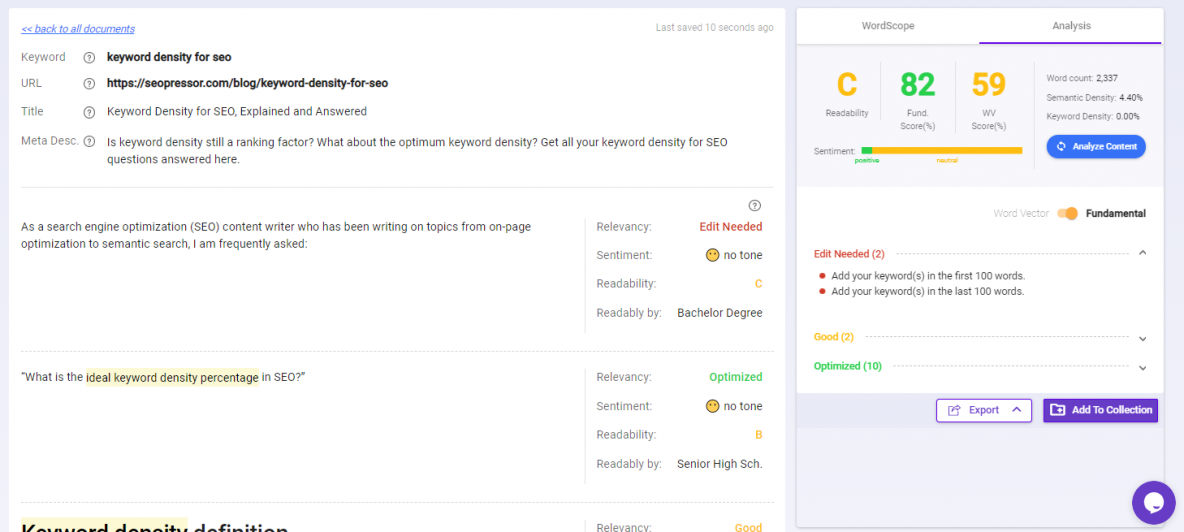
A tool that checks all the right boxes in this regard is BiQ’s Content Intelligence. For any keyword (yes, that’s right, any!) keyword you have in mind, Content Intelligence analyzes it with the top-performing organic content on Google.
Better still, it gives you a breakdown of your keyword in terms of usage, similar keywords, and example sentences. Talk about the holy grail of content marketing tools!
- Ranking
Most SEO tools are designed to measure the ranking of individual websites.
They leverage complex and compelling algorithms to help you narrow the content gap between you and your best-performing competitor.
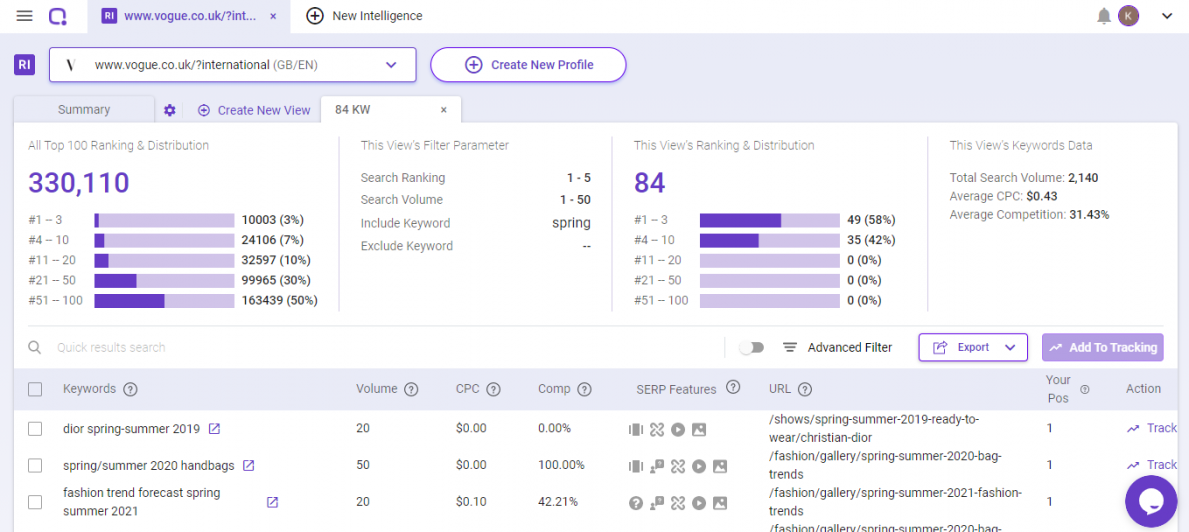
BiQ’s Ranking Intelligence does this and so much more! Add this tool to your SEO arsenal, and you can say goodbye to keyword cannibalization, weak URLs, and a lean, messy keyword map.
- Competitor website
Some SEO tools closely emulate Google Console, helping you fill in the missing data or time lag that comes with page rank movement.
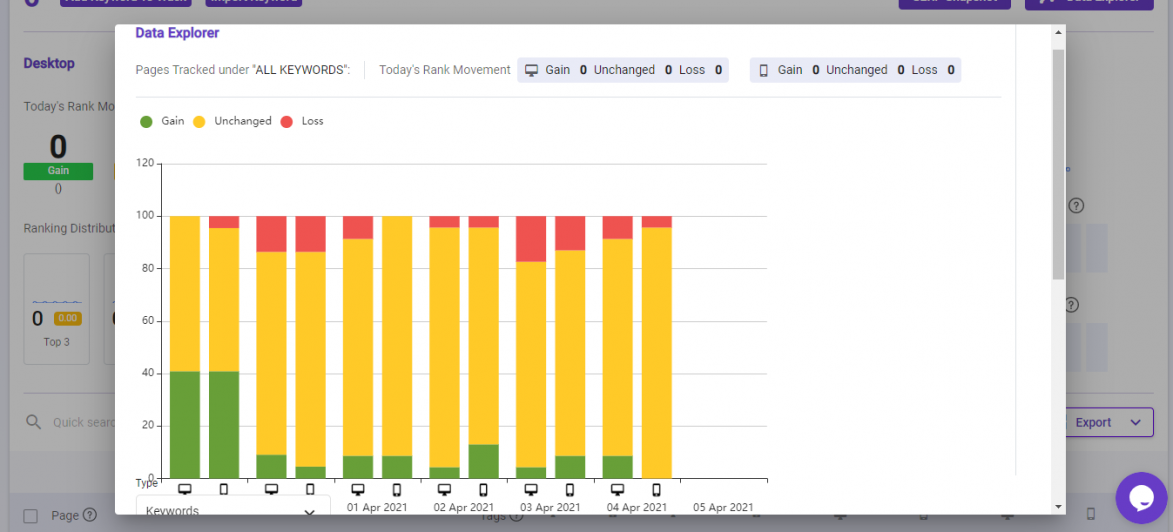
BiQ’s Rank Tracking is the perfect example of a rank tracking tool that leaves nothing to chance (at least SEOwise!)
Free SEO Tools
Only one thing beats getting a reasonable price on something, and that’s getting it for free!
It’s common knowledge that anything “free” comes with a cost to it, but that doesn’t mean free SEO tools are a total letdown. Not at all.
Free SEO tools are actually:
1. Good for beginners or solopreneurs
If you’re dipping your toes into the waters of SEO, the best decision you can make is to utilize free tools.
Tools are vital to doing your own SEO and learning the ropes of how the industry works, but many of them cost an arm and leg.
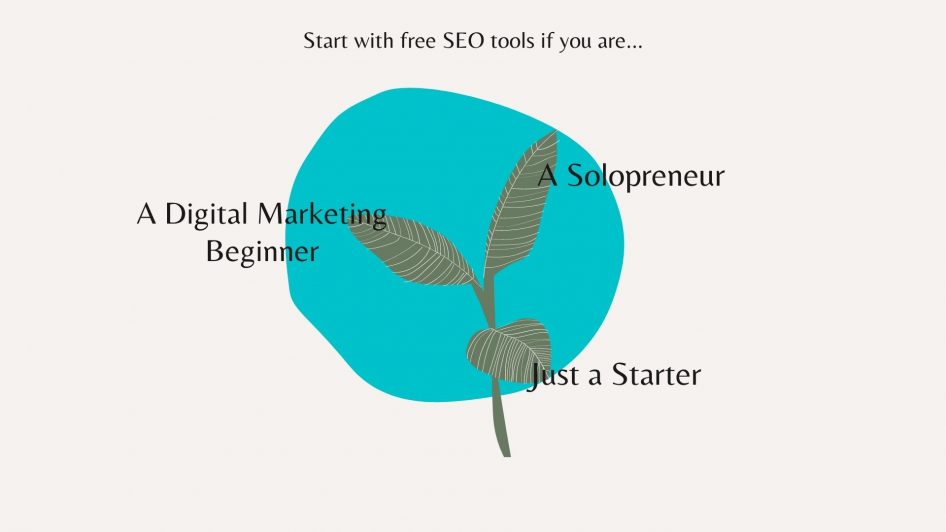
As a solopreneur or beginner with limited funds, it’s unnecessary to break the bank for a paid SEO tool. After all, you don’t need that much SEO knowledge to set your content marketing ball rolling.
Once you know what you’re looking for (think: basic keyword research, website indexing, entry-level analytics, etc.) and what you’re doing, then you can move on to something advanced. Meanwhile, stick to using a free SEO tool.
In fact, you’ll be surprised at just how many quality SEO tools are available for free!
2. Good for testing out/learning SEO
SEO is a maze.
Most of us loved mazes when we were children. Immediately we got those activity books from the supermarket, we would zoom right past the coloring pages and connected dots searching for a maze (at least I know I did!)
When you’re learning SEO, it can be difficult to figure out which SEO technique to use and which ones to avoid—just like an actual maze. You can end up walking into a damn wall, and then you’d need to pick yourself up, turn around, and find the point at which you should have gone in the first place.
Free tools remove the guesswork out of the maze that is SEO. Most of them are available as basic editions with a limited type of data and usage, meaning they can help you learn SEO fast.
Examples of good free SEO tools include:
Google Search Console: Every SEO professional has a Google Search Console account, so the sooner solopreneurs/starters get on board, the better.
It can help you learn a great deal of information about your site and the people who visit it. Use it to understand and monitor page popularity, traffic, website indexing, and other key SEO metrics.
Ubersuggest: Don’t pay for every SEO resource imaginable when you can utilize Ubersuggest for free! Use it to find out your website’s organic monthly traffic, domain score, backlinks, and more.
MozBar: This free Chrome extension is an absolute gem because it can help you perform on-page analysis and SERP analysis straight off the bat!
BiQ LiveKeyword: Available as an add-on extension, BiQ LiveKeyword provides useful keyword metrics for beginners to excel in keyword research. Use it to generate on-the-go data regarding Cost Per Click (CPC), Search Volume, and Competition!
But there’s a caveat here: some of these free SEO tools provide a minimal amount of data.
If, for example, you’re using them for content analysis, they can only help to optimize your content for target keyword(s). Of course, that is an important aspect. But they won’t show you gaps in your content strategy or how to save time on your keyword research.
This brings us to paid SEO tools…
Paid SEO Tools
If you’ve been around the SEO space for long enough, you know that knowledge is power. You know that SEO knowledge is only half as good as the data it’s built on.
But you also know that you won’t get cutting-edge, reliable, actionable insights if you’re still hell-bent on using free SEO tools.
Enter paid SEO tools.
Agencies, eCommerce businesses, and other established entities can find real value in paid SEO tools.
Paid SEO tools are incredibly useful because they:
1. Saves a lot of time
Running a successful, multi-faceted online business comes with its fair share of bottlenecks. One of them is having to deal with repetitive and mundane SEO audits (and tasks).
What if there was a way out of this rabbit hole? Of course, there’s a way, courtesy of paid SEO tools!
A paid SEO tool can provide you with massive time-saving benefits.
It can cut in half the time it takes to complete monotonous SEO audits while delivering the same (or better) quality results.
2. Identify low-hanging fruit keywords.
Paid SEO tools help you find keywords that you might have never thought of before, something you can’t quite do with free SEO tools.
In case you didn’t know, low-hanging keywords are phrases that are already ranking well on Google. These are ones you need to optimize because of their potential to bring more visitors to your site.

One way to find such keywords is through rank analysis. Another way is to find keywords that you are already performing well on and present variations that can increase your site’s visibility even further.
Yup, it’s only through a paid SEO tool that you can find these low-hanging fruit keywords and ranking opportunities.
3. Give an in-depth analysis
Tools offer a crazy amount of SEO information, whether they are paid or free.
Whether it’s data about backlinks, shares, purchasing behavior, page speed, or keyword research, these tools deliver it in a comprehensive, consumable manner.
But paid SEO tools take the concept of analysis a notch higher.
They help you make sense of the data through conceptualization and visualization.
Many of them will generate graphical reports that allow you to see and evaluate data at a glance. These are particularly helpful if you’re not a numbers person or need to explain complicated SEO metrics to clients.
In the long-term, conceptualized analysis can prove even more valuable if you’re analyzing your marketing campaigns’ success.
4. Detect and fix deeper issues
Wouldn’t you love it if you could identify what exactly is causing your content not to rank high on SERPs? Wouldn’t it be awesome if you had some way of knowing what’s ailing your website performance?
These tools can help you find and troubleshoot deeply-etched SEO issues, such as:
- Website speed
- Broken links
- Duplicate, underperforming, and missing content
- Missing alt tags and broken images
- Messy URLs
- Low word count
- Substandard mobile experience
- And a lot more!
To make sure your website/content is functioning efficiently and optimally, take a proactive approach. Employ a paid SEO tool to fix any issues on the spot.
5. Give a front-row view of your competitors’ SEO strategies
Wouldn’t you jump for joy if you knew that one SEO secret that makes your closest competitor tick?
Fortunately, you can leverage the power of paid SEO tools to spy on the competition without crossing any ethical lines or appearing too shady!
Many SEO tools, like BiQ’s Rank Intelligence and Rank Tracking, allow you to dive into your best-performing competitor’s strategy.
Not only can you see their rankings and traffic numbers, but you also identify how their content is performing across all platforms and where their backlinks are stemming from.
6. Benefits you financially in the long run
All the mumble-jumble surrounding paid SEO tools come down to just one question: are they worth the money? And given that some paid tools require a subscription fee of up to $99/month, this is an area that you need to tread with caution.

Before investing in any tool, it’s important to ask yourself whether it’ll provide a return on your investment. To some, paying for SEO tools isn’t necessary. Sure, you can live off with just the free tools available on the market or do your researches manually.
But as the saying goes, “time is money.”
That said, carefully assess your options. Use free versions to see if a particular tool works for you and whether it can grow your ROI as envisioned.
Some examples of good paid SEO tools include:
- Ahrefs
This paid SEO resource is a fan favorite in the content marketing world—and for a good reason. It boasts some of the most comprehensive data collecting and analysis tools out there. So you can be sure that their SEO audits and reports as up-to-date and accurate as possible.
- SEMrush
If you want reams of SEO information (think: competitor’s data, backlinks, organic traffic, etc.) at the tip of your fingers, SEMrush is the tool to invest in.
- Moz Pro
A one-of-its-kind, all-in-one paid SEO tool, Ahrefs can potentially save you pennies on the dollar. On-page analysis, site audits, links, keywords, rank tracking are all covered.
- BiQ
BiQ Cloud is a suite of top-notch SEO tools that deserves its inclusion in this list.
Keyword Intelligence: Helps you find high-value keywords that give you more traffic at a lower competition.
Content Intelligence: If all you ever wanted is to write highly-optimized, engaging, AI-guided content, then this tool should definitely be in your SEO arsenal.
Rank Intelligence: Do you dream of ranking on the very first page of Google? This paid SEO tool tells you ALL the keywords you are ranking for (including the ones you don’t target) so that you never miss that top spot!
Rank Tracking: Helps you save an enormous amount of time by discovering all the keywords you are ranking for—on the fly!
Conclusion
Both free and paid SEO tools are out there to help ease your work as a marketer. Free tools might be a popular option among most (obviously because they’re free!), but that doesn’t mean paid SEO tools are not sought out. In fact, most big corporations and savvy marketers would need a more comprehensive tool in managing their content. So, we hope that this blog helps you make the right decision.




